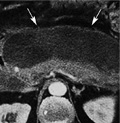The eLitMed.hu medical portal uses computer cookies for convenient operation. Detailed information can be found in the Cookie-policy.
LAM Extra for General Practicioners - 2009;1(03)
Content
[TREATMENT OF ACUTE PANCREATITIS, WITH SPECIAL REGARD TO PHARMACEUTICAL THERAPY]
[Treatment of acute pancreatitis is mainly supportive, including the correction of any factors causing or sustaining the disease process, efforts to limit complications, as well as treatment of complications. Pharmaceutical efforts to influence the pathophysiological events with protease inhibitors or by influencing the release of the pro-inflammatory cytokine cascade did not prove to be effective, so there is no known effective and specific drug therapy for clinical use. Adequate pain control is an important component of pharmaceutical management, and - although yet controversial - early antibiotic prophylaxis and effective antimicrobial treatment of the inflammatory complications (infected necrosis or fluid collection, SIRS, sepsis) have probably a determining role in the outcome of severe necrotizing pancreatitis. Carbapenems proved to be the most potent antibiotics. For the prevention of the not infrequent fungal superinfection in acute pancreatitis, early administration of fluconasole can also decrease mortality. Surgery is indicated in the first stage of infected necrosis and infected pancreatic and peripancreatic fluid collections. In certain patients with a high operative risk, endoscopic or percutaneous drainage with lavage can also be worth trying. Optimal conditions for the treatment of severe necrotizing pancreatitis, as well as adequate management of multiple organ failure can only be warranted at an intensive care unit. In the chemoprevention of pancreatitis complicating endoscopic retrograde cholangiopancreatography (ERCP), non-steroidal anti-inflammatory drugs promise a new therapeutic option. There are insufficient data about the beneficial effects of the protease inhibitor ulinastatin, and results with nitroglycerin are contradictory.]
1.
Clinical Neuroscience
[Headache registry in Szeged: Experiences regarding to migraine patients]2.
Clinical Neuroscience
[The new target population of stroke awareness campaign: Kindergarten students ]3.
Clinical Neuroscience
Is there any difference in mortality rates of atrial fibrillation detected before or after ischemic stroke?4.
Clinical Neuroscience
Factors influencing the level of stigma in Parkinson’s disease in western Turkey5.
Clinical Neuroscience
[The effects of demographic and clinical factors on the severity of poststroke aphasia]1.
2.
3.
4.
5.



